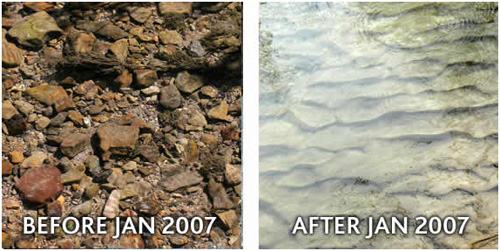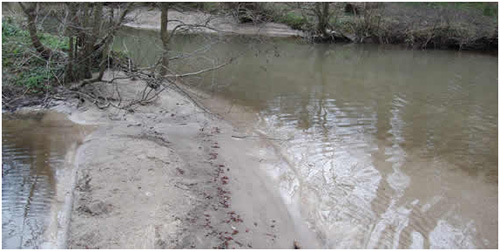Fish Legal, the legal arm of the Angling Trust, report that the Waltonian Angling Club has welcomed settlement of their four year legal case against Glebe Mines Ltd after their stretch of the River Derwent in the Peak District was engulfed by tonnes of quarry ‘tailings’.

In several incidents in 2007 huge quantities of the residue, generated by an industrial process to remove minerals, escaped from a holding lagoon on a hillside when the lagoon burst. The tailings flowed into the Stoke Brook and then into the River Derwent filling up pools and sending plumes of sediment as far down as the confluence with the Trent – many miles downstream.
The Defendant pleaded guilty to offences under the Water Resources Act 1991 and was convicted for two separate incidents in January and August 2007.
After waiting to gauge any long term damage due to the high levels of lead and other toxic metals in the tailings, Fish Legal issued proceedings at Court against Glebe Mines when its insurance company’s loss adjusters refused to settle the case. In the end the case was soon resolved without the need for a trial.
Dr Steve Furness of the Waltonian Anglers remembers:
“In all my years as a fisherman and ecologist I have rarely come across pollution so devastating. The tailings had completely engulfed Stoke Brook and left substantial deposits in the River Derwent. It was very upsetting to see that one of the most outstanding fisheries of the Derwent – one I had enjoyed fishing over many years – had been so badly affected.”
Initial concerns that heavy metals in the tailings could be “assimilated” through the food chain were proved right in investigations carried out by an expert instructed by Fish Legal.
Although the company was eventually prosecuted, anglers had been fearful that valuable stocks of fish may be affected in the years to come by the levels of lead and other heavy metals from the tailings The Waltonians experienced a more direct problem: they couldn’t safely wade for 18 months and so fishing was severely impaired.

Dr Steve Furness said:
“I remember one area that had previously been completely open and clear was now partially dammed by a spit of deposited tailings reaching out into the river. This was quite amazing because the river was normally around two metres deep at this point. You could no longer wade in order to fish without seriously endangering yourself. The tailings had the effect of making the river bed like quick-sand and any person standing in it would quickly sink. There were also signs placed around the river by the National Park Authority to warn people of this danger.”
The heavy-metal laden sediment remained in the Stoke Brook and Derwent until remedial works to remove it commenced 18 months after the first incident.
Mark Lloyd, Chief Executive of the Angling Trust and Fish Legal said:
“This was a very complex case involving significant costs and time for our whole team over many years. I am pleased that it has been resolved and that the company will compensate our member club for the damage to its fishing. Our legal team is unique in being able to take on cases such as this on behalf of our 1,000 member clubs, riparian owners and fisheries, and for the benefit of all anglers. We hope that this action will deter other companies from causing such catastrophic pollution.”
For more information on Fish Legal’s work click HERE










